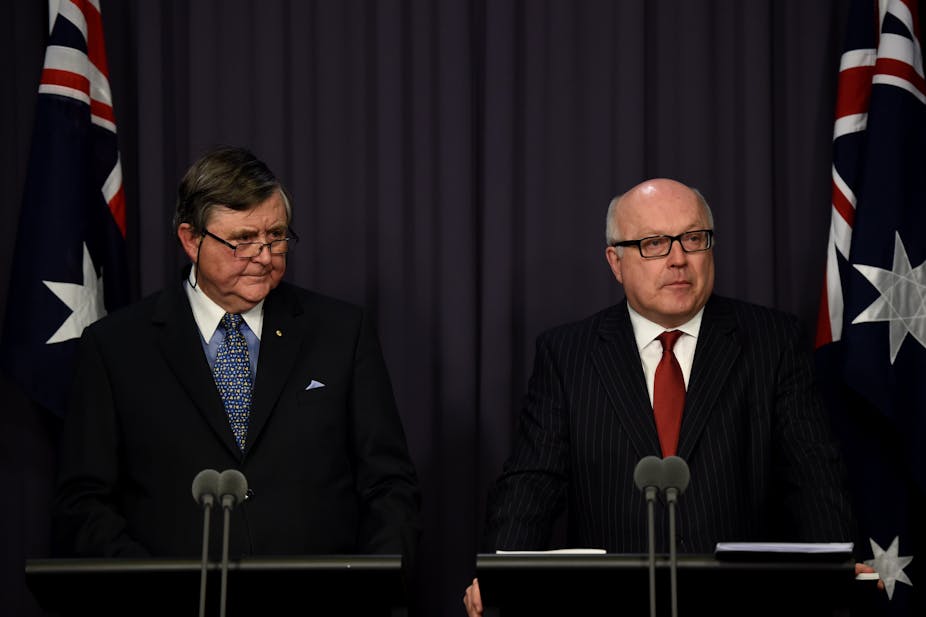The Abbott government has unveiled the first in what is expected to be a suite of reforms aimed at strengthening Australia’s national security.
The bill introduced into the Senate yesterday by attorney-general George Brandis incorporated a vast array of amendments to Australia’s national security institutions. Many of these amendments were relatively uncontentious updates to existing bodies. For instance, employment conditions for Australian Security Intelligence Organisation (ASIO) officers were amended and some defence agencies were renamed “to better reflect their roles”.
However, notably absent from the bill were some of the government’s more controversial national security initiatives, including mooted provisions relating to mandatory data retention and returned foreign fighters.
That said, the bill brings about some important amendments to existing laws, some of which would grant ASIO enhanced powers to access private data, and others that place severe limits on the ways in which intelligence information may be handled.
Greater access
The bill would amend the definition of a computer for the purposes of national security to include all computers on a system or network.
This revision has the capacity to significantly impact the privacy of innocent third parties to a warrant. If ASIO obtains a warrant to access a single computer, this amendment would allow officers to also access any computers on the same system or network.
This increased access could encompass tens or hundreds of computers when the target computer is part of, for example, a university network or corporate network. Many, even most, of these devices would likely belong to innocent third parties.
Further provisions of the bill limit the existing blanket-prohibition on ASIO adding, deleting or altering data on a computer, or obstructing the lawful use of the target computer.
In light of the extension of the definition of a computer, this amendment has the capacity to expand a single warrant for a single computer into a much more encompassing document. It would allow ASIO officers to potentially interfere with entire computer networks in significant ways.
It is undeniable that ASIO requires updated powers in order to complete intelligence operations in modern conditions. Greater access to data networks and capacities to interact with those networks flexibly and effectively are also important in maintaining Australia’s national security.
However, these expanded powers call for greater safeguards. Warrants are the primary safeguard by which ASIO’s considerable and invasive powers are kept in check. The expansion of single-computer warrants to computer-network warrants arguably avoids this check in an important way.
Other amendments aimed at “streamlining” or “simplifying” warrant processes should also attract careful scrutiny.

More secrecy
In addition to increasing the powers of ASIO to access data stored on computer networks, the bill tightens controls on the disclosure of information by ASIO agents by introducing a series of new offences.
Under existing law, it is an offence to disclose secret intelligence-related or operational information. These provisions have resulted in prosecutions, including that of ASIO officer James Paul Seivers. His conviction for leaking documents related to the 2002 Bali bombings was overturned by the ACT Court of Appeal in 2010.
The bill’s provisions would introduce new offences punishable by up to three years’ imprisonment for “unauthorised dealings” with intelligence-related materials. Actions captured by the provisions include copying, removing or retaining the materials.
The breadth of this offence represents a significant ramping-up of the constraints placed on the way that intelligence information may be handled.
The second “tier” of the new framework controlling the use of intelligence information is an increase from two years to ten years’ maximum imprisonment for the unauthorised communication of such information.
This was the same offence that the ACT Supreme Court found Seivers guilty of, sentencing him to only 12 months’ imprisonment. Seivers had already served this sentence by the time his conviction was quashed by the Court of Appeal.
These considerably enhanced penalties for the unauthorised use or communication of intelligence information reflect the heightened global awareness and governmental fear of leaks and whistleblowers in the wake of the WikiLeaks and Edward Snowden controversies. Brandis pointed to this in the second reading speech for the bill:
As recent, high-profile international events demonstrate, in the wrong hands, classified or sensitive information is capable of global dissemination at the click of a button. Unauthorised disclosures on the scale now possible in the online environment can have devastating consequences for a country’s international relationships and intelligence capabilities.
The bill makes it clear that the Australian government is seeking to protect itself against a Snowden scenario. The provisions place severe limits on ASIO officers’ capacities to handle intelligence information as any mishandling will risk criminal penalty.
Wider implications
This bill is part of the government’s response to a series of national security inquiries and reports, in particular the Parliamentary Joint Committee on Intelligence and Security (PJCIS) Inquiry into potential reforms of National Security Legislation.
However, many of the recommendations made by the committee, as well as those made by the Council of Australian Governments and the then Independent National Security Legislation Monitor (INSLM), Bret Walker SC, remain largely unaddressed.
Clearly, Australia’s national security framework will continue to evolve. We can expect that this evolution will be complex and controversial. In this context, the importance of public awareness at the legislative stage is crucial as, once in force, these schemes are often shrouded in secrecy.
These laws also underscore the continued importance of safeguards built into the provisions. They highlight that the position of INSLM, which is now set to be retained, fills a unique role in reviewing Australia’s national security frameworks on an ongoing basis. The monitor provides a degree of openness and public accountability for this highly sensitive facet of government.

